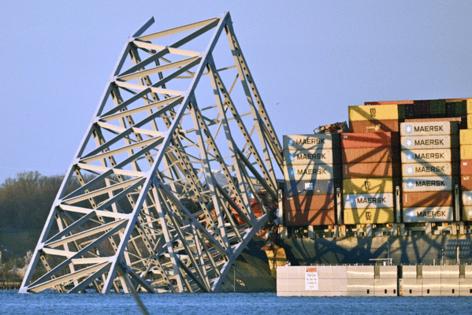Maryland policymakers announce relief for workers, businesses affected by Key Bridge collapse
Published in Business News
BALTIMORE — The collapse of the Francis Scott Key Bridge will hurt Maryland businesses and disrupt income for thousands of workers who rely on the Port of Baltimore for the foreseeable future. Maryland politicians are working to triage the bleeding.
“When we had the pandemic, the port was open,” Senate President Bill Ferguson said Friday. “This the first time in recent memory where the public and private terminals and all of the businesses associated with it are closed.”
Text for a bill intending to provide economic relief for industries reliant on the port became available Friday. The legislation is being ushered through the General Assembly by Ferguson, House Judiciary Committee Chair Luke Clippinger — both South Baltimore Democrats representing parts of the port — as well as Sen. Johnny Ray Salling, a Republican who represents portions of Baltimore County impacted by the disaster.
According to the bill, the Department of Labor would create a temporary financial relief program for people who regularly perform paid work at the port, can’t return to work because of the closure or don’t qualify for unemployment — even if they’re able, available, and actively seeking work — while the Port of Baltimore is closed.
Additionally, the Department of Commerce would stand up a temporary relief program for small businesses and trade associations that rely on the port to function and, because of its closure, can’t give their workers the same hours, pay rate and benefits. Business owners would be mandated to give employees shifts, pay them normal rates and provide them with their benefits to the fullest extent possible while the port is closed. These businesses would be required to repay the state within six months after the port reopens and they begin generating revenue.
The bill would give Gov. Wes Moore, a Democrat, the authority to amend the state budget in order to transfer money to fund both programs after giving the Legislative Policy Committee at least a week to review and comment. If federal funding becomes available, that would be used to fund both relief programs.
Should it pass, the bill would go into effect as soon as Moore signs it. The General Assembly adjourns for the year at 12:01 a.m. on April 9.
In addition to legislative aid, Comptroller Brooke Lierman, a Democrat, announced Friday that her office will waive certain late payment penalties and interest for all Maryland businesses to triage the massive economic blow the state is expected to face following the collapse of the Key Bridge that left one person unscathed, one severely injured, two confirmed dead and four presumed dead.
Businesses do not need to request the waiver. It will be applied automatically.
According to a March report on the economic impact the Port of Baltimore had on the state in 2023, public and private marine terminals for cargo and cruises generated 51,000 direct, induced and indirect jobs, more than $5 billion in personal wages, and $647.1 million in state and local tax revenue.
“While the full economic impact of the Key Bridge collapse and the resulting closure of the Port of Baltimore to shipping is currently unknown, we do know there are businesses in Maryland that will see an immediate impact on their bottom line, and workers who could receive smaller paychecks as crews work to reopen the shipping channel,” Lierman said in a statement Friday.
The late payment and interest penalties waiver for all Maryland businesses will apply to employer withholding taxes, the sales and use tax, the tobacco tax, the motor fuel tax, the admissions and amusement tax, tire fees, bay restoration fees and transportation network fees.
The waiver will apply as long as payment is received on or before May 31. The deadline to file personal income taxes is still April 15.
©2024 Baltimore Sun. Visit baltimoresun.com. Distributed by Tribune Content Agency, LLC.







Comments